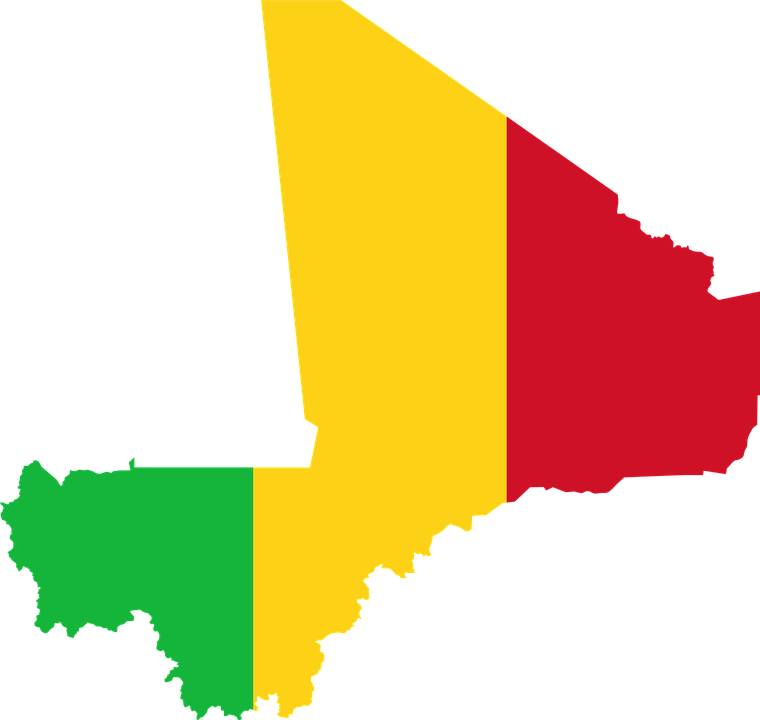By Jemma Challenger

The coup d’état
On the morning of 18th August 2020, mutinous elements of the Malian Armed Forces stormed a military base in the town of Kati, in what constituted the onset of the country’s second coup d’état in under 10 years. Seized military vehicles then headed to the country’s capital, Bamako, where putschists succeeded in detaining a number of key government officials including President Ibrahim Boubacar Keïta. By midnight, Keïta had conceded his presidency and dissolved the government.
Leaders of the coup fired celebratory gunshots as swathes of anti-government protestors rallied around a central square in Bamako to applaud the triumph. The ‘June 5 Movement-Assembly of Patriotic Forces’ (M5-RFP) opposition coalition, formed in mid-2020 to coordinate escalating demonstrations and civil disobedience, supported the toppling; group spokesperson, Nouhoum Togo, announced it constituted “not a military coup but a popular insurrection”. Simultaneously, however, the mutineers were confronted by a unanimous surge of admonition from the international community. The United Nations Security Council (UNSC) pressed soldiers to release detained officials immediately, and “return to their barracks without delay”. The African Union’s (AU’s) President, Cyril Ramaphosa, called for the “immediate return to civilian rule,” briefly suspending Mali from the bloc. The fifteen-nation strong Economic Community of West African States (ECOWAS) announced neighbouring members would close their borders with Mali, and stipulated sanctions against “all the putschists and their partners and collaborators”. France, the US, China, Turkey, Germany, South Africa and Nigeria were amongst a wealth of nations to publicly condemn the coup independently.
Several months down the line, the military junta continues to grapple with its commitment to establish a comprehensive transition to democratic rule that adequately conciliates this international community. It remains, therefore, an apt time to reflect upon the protracted role international actors have played in Mali, and to assess their accountability vis-à-vis the latest coup. Indeed, the international community at large has long been directly embroiled within Malian affairs, to the extent that to dissect the country’s political landscape without seriously reflecting upon its external stakeholders is to abandon half the picture. How did the political scene evolve in such a way that posed conditions ripe for a coup that enjoyed such a degree of popular domestic support? And how did these quite cataclysmic developments emerge right under the nose of a corpus of intervenors comprising well over 15,000 international troops in Mali?
This article will demonstrate that key intervenors - the United Nations (UN) and France - are prioritising short-term military, and tacitly pro-incumbent solutions to a highly political conflict. Accordingly, they jeopardise prospects for security, fail to hold leaders to account, and permit political grievances to spiral. It is vital that the 2020 coup is understood against this backdrop.
The international community in Mali
For scholar Nina Wilén, the coup is a stark reminder of how local political conflict endures in spite of a weighty external presence. Embodying a ‘logic of its own’, engagement in Mali - that is, a militarily well-endowed French-led counter-terrorist operation, a sizeable and robust UN peacekeeping operation, a United States (US) Africa Command drone base, three European Union (EU) missions, and the creation of a new Special Forces Joint Task Force - is insufficiently cognisant of local realities and dynamics on the ground. The intervention is, by and large, inherently state-centric and military dominated. This fails to differentiate between the needs of a range of complex parallel crises in Mali. It also fails to address local, grassroots grievances and conflicts, which in turn offer a valuable source of mobilisation for the extremists and criminal networks that external actors so committedly endeavour to eradicate.
For instance, the UN operation was, until recently, situated almost exclusively in line with the explicit jihadist threat in the north of Mali. Meanwhile, localised agricultural conflict plaguing Central communities escalated rapidly for a number of years, into what now constitutes the epicentre of violence in Mali. This is a flagrant missed opportunity for the intervention. In prioritising symptoms over causes, and short-term security imperatives over long-term diplomatic and grassroots political efforts, the UN failed to prevent a dire security crisis from unfurling under its nose. Jihadists were able to successfully draw upon a political vacuum, popular grievances, and cleavages along ethnic lines to mobilise support from occluded rural populations. This rendered UN efforts to ‘impede, impair and isolate’ the terrorist threat’ in the North rather futile. In inadequately responding to grievance-based local conflicts, external intervention has done little to quell the root of popular unrest, whilst adding fuel to the flames of jihadist networks and transnational criminal organisations.
Simultaneously, the permanent external military presence reduces incentives for the state to engage in crucial reforms and productive political dialogue. In what one scholar of Sahelian politics, Yvan Guichaoua, describes as the ‘bitter harvest of French interventionism’, France’s entrenched armed presence - dominated foremostly by enemy-centric security agendas – is acting as a ‘de facto military guarantor’ of the security of the Malian regime. In doing so, France effectively disincentivises any sitting government in Mali to engage in dialogue with its adversaries in order to reach political compromises. As Michael Shurkin of RAND fittingly suggests, France’s operational objective is, as of now, little more than the creation of ‘strategic possibilities’ that some other partner might be able to exploit. Thus far, the intervention has shown little inclination to hold a sitting regime to account, or push even for the somewhat lacklustre reforms proposed in a 2015 peace agreement. Against this backdrop, external intervention has something to answer for with regards to the popular discontent that paved the way for the coup it denounced so quickly last August.
The coming months will undoubtedly play a critical role in defining the trajectory of the crisis in Mali. Colonel Major Ismaël Wagué, spokesman for the self-proclaimed National Committee for the Salvation of the People (CNSP) military junta, explicitly pledged cooperation with the international community from the outset; for him, the UN and France are “partners in the restoration of stability.” Yet, for all that the CNSP avow their dedication to maintain military collaboration with intervenors, and for all intervenors assure their sustained armed presence on the Sahel, lasting security without popular support and a comprehensive political strategy will doubtless prove untenable. Intervenors in Mali must acknowledge that the crisis of the ‘weak state’ in Mali lies not at the hands of a discontented citizenry, but in the radical social distance between this citizenry and its political class. Viewed through this optic, the coup has but foregrounded longstanding shortcomings of the international community in Mali that must be conceded and transformed in order to make meaningful progress towards stability.
Jemma Challenger is an MA student of International Conflict Studies at King’s College London and a graduate of the University of Leeds, where she studied a BA in Philosophy, Politics and Economics. Her central research interests include UN intervention in conflict, peacebuilding and state-building processes, and the qualitative study of comparative civil wars. You can find her on Twitter @jemmachallenger.





